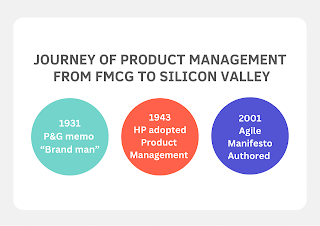The Journey of Product Management: From FMCG to Silicon Valley
Product management, a role that is now pivotal in the tech industry, has a rich history that dates back to the early 20th century. It all started with a memo at Procter & Gamble (P&G), an FMCG company, and eventually found its way into tech giants like HP, Intuit, Microsoft, Google, and many others in Silicon Valley.
The Birth of Product Management at P&G
In 1931, Neil H. McElroy, a junior executive at P&G, penned a memo that would lay the foundation for modern product management. Frustrated with the internal competition between P&G's soap brands, McElroy proposed a new role, the "Brand Man," who would take complete responsibility for a brand, including its promotion, sales, and even product wrapper revisions.
The "Brand Man" was not just a marketing or advertising role; it was a radical shift in management, moving decision-making closer to the customer. McElroy's idea was to have these "brand men" understand the problems of their customers and develop solutions accordingly. This approach transformed P&G into a brand-centric organization and laid the groundwork for what we now know as product management.
Adoption into Tech Companies: The HP Way
McElroy's influence extended beyond P&G. As an advisor at Stanford University, he mentored Bill Hewlett and David Packard, who incorporated McElroy’s “brand man” ideas into their company, Hewlett-Packard (HP).
At HP, the role of the "product manager" was officially created in the 1940s. Unlike the "brand men" at P&G who worked closely with marketing and sales, the "product managers" at HP worked more closely with engineering. They were tasked with understanding customer problems and acting as their voice within HP. This customer-centric approach contributed significantly to HP's unparalleled success, including a 50-year record of 20% year-on-year growth.
The Silicon Valley Adoption
The principles of product management developed by P&G and HP permeated Silicon Valley, influencing tech giants like Intuit, Microsoft, and Google. As the tech industry grew, the separation between product development and marketing became untenable. It was imperative not just to understand the customer and their needs, but to align the product’s development with them.
In companies like Intuit, Microsoft, and Google, product managers became the bridge between the technical team and the customer. They played a crucial role in understanding the market, defining the product vision, and working with the engineering team to deliver products that met customer needs and expectations.
The Agile Revolution
The Agile Manifesto, created in 2001, marked a significant shift in product development. It emphasized individuals and interactions over processes and tools, working software over comprehensive documentation, customer collaboration over contract negotiation, and responding to change over following a plan. This shift brought product development back to the center of the product management role, making it more customer-centric and collaborative.
Agile methodologies like Scrum and Kanban became popular in Silicon Valley, with companies like Google and Microsoft adopting them. These methodologies allowed for faster iterations, better responsiveness to market changes, and closer collaboration between product managers, engineers, and customers.
The Importance of Product Management Today
Today, product management is a standalone function with a seat at the management table, reporting directly to the CEO. It aligns the product team directly with the business vision and goals, making them internal as well as external evangelists of that vision.
Product management has become a sustainable competitive advantage, absorbing parts of marketing and user experience. It embraces fluid processes that adapt to the team, the product, and the market, whether it's Scrum, Kanban, or a combination of both.
In the tech industry, product managers are now seen as key strategic leaders. They are responsible for the overall success of the product, from its conception to its launch and beyond. They work closely with various teams, including engineering, design, marketing, and sales, to ensure that the product meets the needs of the customer and achieves business objectives.
From its humble beginnings at P&G to its widespread adoption in Silicon Valley, product management has evolved into a critical role in today's businesses. It's a discipline that requires a deep understanding of the customer, a passion for the product, and a commitment to continuous learning and improvement. As we look to the future, the importance of product management will only continue to grow. Whether it's in an FMCG company like P&G or a tech giant in Silicon Valley, product managers will continue to play a pivotal role in driving business success.


Comments
Post a Comment